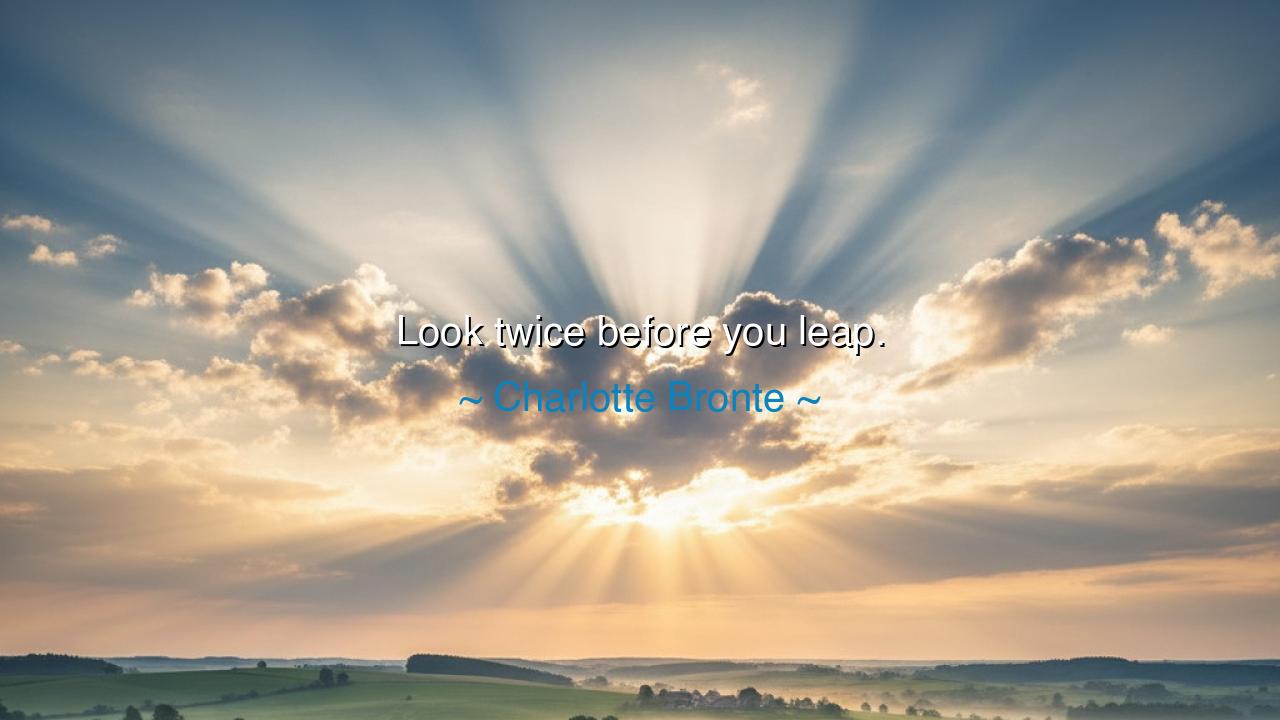
Look twice before you leap.






The brilliant novelist Charlotte Brontë, whose words often revealed the depths of the human heart, gave this timeless counsel: “Look twice before you leap.” Though simple in form, these words carry profound wisdom. They teach that in life, decisions are like cliffs—once you leap, there is no turning back. To look twice is to pause, to consider carefully the dangers and consequences before plunging into action. This is not a call to fear or hesitation, but to foresight and discernment, virtues that guard the soul against ruin.
To leap blindly is the way of the reckless. It is driven by impulse, pride, or impatience, and though it may sometimes bring short-lived victories, it often leads to lasting regret. Looking twice does not weaken courage; rather, it strengthens it by uniting bravery with wisdom. The warrior who surveys the battlefield before charging is not less heroic than the one who rushes headlong; he is simply more likely to triumph. Thus, Brontë’s teaching is a balance of daring and caution, where action is tempered by thought.
History provides a shining example in the life of Julius Caesar. Before crossing the fateful Rubicon River, he paused and considered the immense consequences: war, bloodshed, and the end of the Roman Republic. Though he ultimately chose to leap, it was a decision made with full awareness of its weight. His pause—his moment of looking twice—did not prevent the leap but gave it purpose and clarity. In contrast, many rulers who acted rashly, without reflection, brought disaster upon themselves and their people.
Conversely, the fall of Napoleon Bonaparte during his invasion of Russia stands as a warning. Driven by ambition, he rushed into a vast and unforgiving land without fully considering the realities of winter, supply lines, and resistance. Had he looked twice, weighing the dangers with a clear mind, he might have preserved his empire. Instead, his rashness led to ruin, proving the dire cost of neglecting Brontë’s wisdom.
Let this teaching be carried forward through the ages: courage must be guided by foresight. Before you act, look twice—examine your motives, measure the risks, and seek understanding. Then, when you leap, do so with the strength of one who has chosen wisely, not blindly. For in this union of thought and action lies the path to lasting victory, and the avoidance of sorrow. As Charlotte Brontë teaches, wisdom is not the absence of daring, but the harmony of vision and resolve.






HNHuong Nguyen
I find it interesting that this quote encourages us to step back and really think before making decisions, but I wonder—how long is 'twice' exactly? Is it simply a moment to pause and reflect, or does it suggest a more detailed process of analysis? In today's fast-paced world, it can sometimes feel like pausing is a luxury. Does this advice seem practical in modern life, or is it more suited to a different era where life moved slower?
TANguyen Tuan anh
I always find it challenging to balance caution and boldness. While 'looking twice' sounds like solid advice, it also seems to reflect fear of making a mistake. In some ways, hesitation can paralyze us, right? In a world that celebrates risk-taking and speed, can we afford to hesitate too much? Maybe Brontë’s advice is more about finding the sweet spot between caution and courage. How do you interpret the tension between taking risks and being overly cautious?
SYHui Simp yanfei
I wonder if the message in this quote applies to all situations or if there are some moments when it's better to trust your gut and take the leap without overthinking. Life often demands quick decisions, and too much caution could hold us back. Does overanalyzing prevent us from seizing opportunities? I'm curious to know how this idea fits into the context of Brontë's life and works—did she tend to be cautious or more impulsive in her own choices?
TTTran Tien
This quote makes me think about how often people rush into decisions without considering all the possible consequences. We tend to act on impulse or emotion, only to realize later that we should have taken more time to think things through. Do you think that second thoughts are always necessary, or can acting on instinct sometimes lead to better outcomes? What do you think Charlotte Brontë meant by the idea of 'looking twice' before taking action?